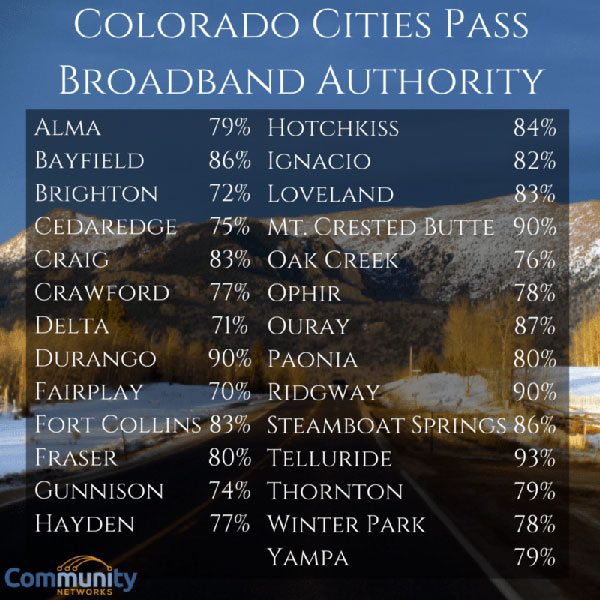
January 4, 2018; Next City
In Fort Collins, Colorado, the City Council has given construction of a municipal broadband network an official green light, reports Rachel Dovey for Next City. The 7-0 City Council vote followed a ballot resolution passed with 57 percent of the vote last November.
Implementing the legislation commits the city to maintaining net neutrality, prohibiting data caps or usage limits, reports Jon Brodkin of Ars Technica. According to Nick Coltrain of the Coloradoan, the City Council vote releases $1.8 million from the city’s general fund to begin the system’s rollout, slated to be repaid with a bond issue in the spring. Buildout of what is known as FTTP or “fiber-to-the-premise” is being financed with up to $150 million in authorized bond financing. The city estimates that full fiber network construction will take three to five years.
Brodkin points out that last November’s ballot initiative passed by 14 percentage points, even though opponents, led by Colorado Cable Telecommunications Association (of which Comcast is a member) outspent advocates by a margin of $900,000 to $15,000.
As NPQ noted last month, the shortfall of broadband coverage is more severe in rural areas, where leveraging the nation’s network of rural electric cooperatives provides one viable route for closing the shortfall in coverage.
Sign up for our free newsletters
Subscribe to NPQ's newsletters to have our top stories delivered directly to your inbox.
By signing up, you agree to our privacy policy and terms of use, and to receive messages from NPQ and our partners.
But cities often have their own reasons for wanting faster broadband. In Chattanooga, demand for high-quality fiber service from Volkswagen was an initial driver, although after creating the network for Volkswagen, the city-owned utility realized that high-speed service could be extended to residents at low cost; it currently offers residents one-gigabyte-per-second service at a cost of $70 a month. David Morris in Fortune notes that, “Chattanooga’s network, which went online in 2010 over industry opposition, has turned a profit and helped finance upgrades to the city’s electrical grid, while forcing Comcast to improve its own service in that market.” According to Jason Koebler, writing in Motherboard, the city’s network is also credited with creating “between 2,800 and 5,200 new jobs” and generating roughly $1 billion in “economic benefits for the city” between 2010 and 2015. Nationally, according to Koebler, 83 US cities and towns have “built their own government-owned, fiber-based internet.”
In Colorado, due to a state law passed in 2005, local governments are restricted from using taxpayer dollars to build their own broadband networks, as Tamara Chuang explains in the Denver Post. However, under that same law, cities have the right to hold ballot measures where citizens can vote to “opt out” of the restriction, as Fort Collins has done. To date, an estimated 100 Colorado cities have voted to opt out, including 19 in the latest election cycle.
“The city of Longmont became the first to do so in 2011,” Chuang explains, “and about three years later, the city began offering Internet service at speeds of a gigabit per second, which was much faster than the 20 mbps available from the local cable provider. In August, the city said nearly 90,000 residents can now get gigabit service, which starts at $49.95 a month for residents who sign up within three months of the service launching in their neighborhood.” Chuang writes that “about 53 percent of the population uses the city’s high-speed internet service.”
Chuang adds, “According to the Institute for Local Self-Reliance, which tracks broadband developments nationwide, voters in the 19 Colorado cities and counties said yes to municipal broadband by a high margin—at an average yes rate of 83 percent.”—Steve Dubb













